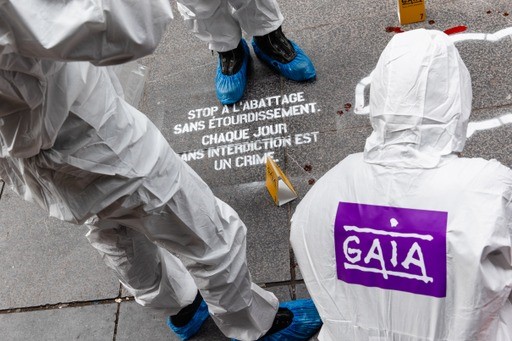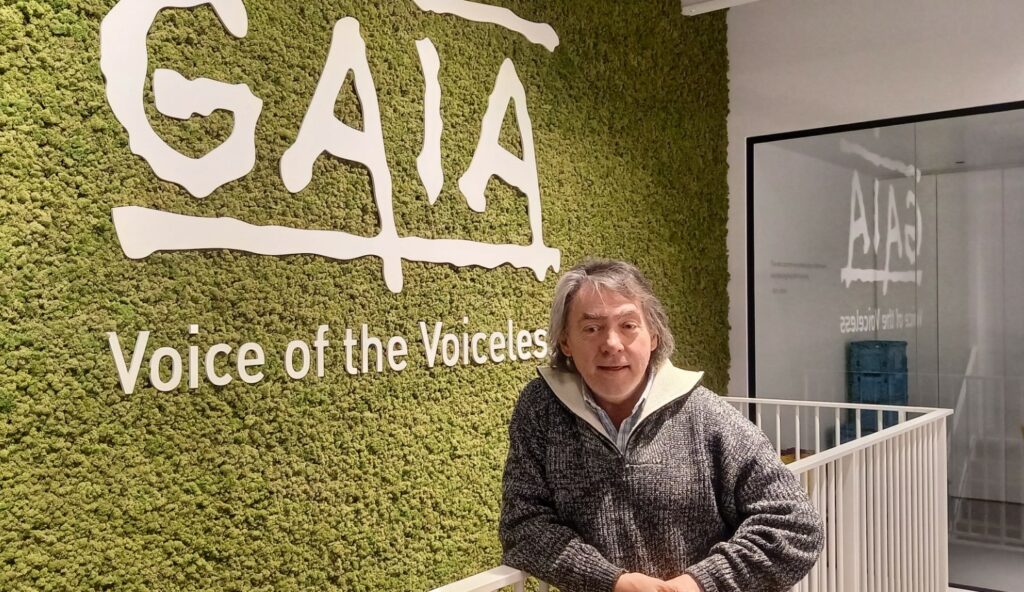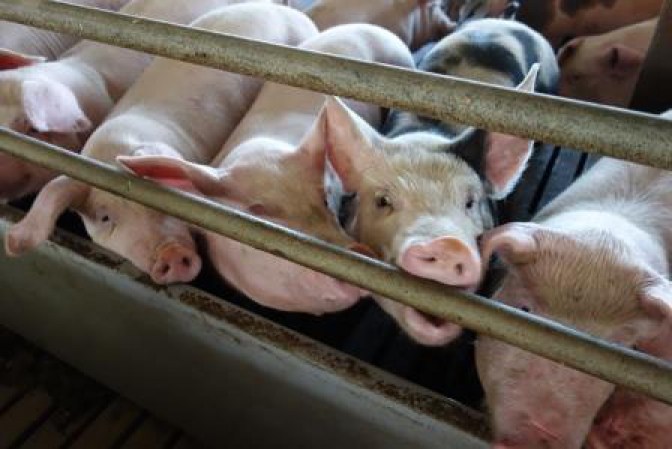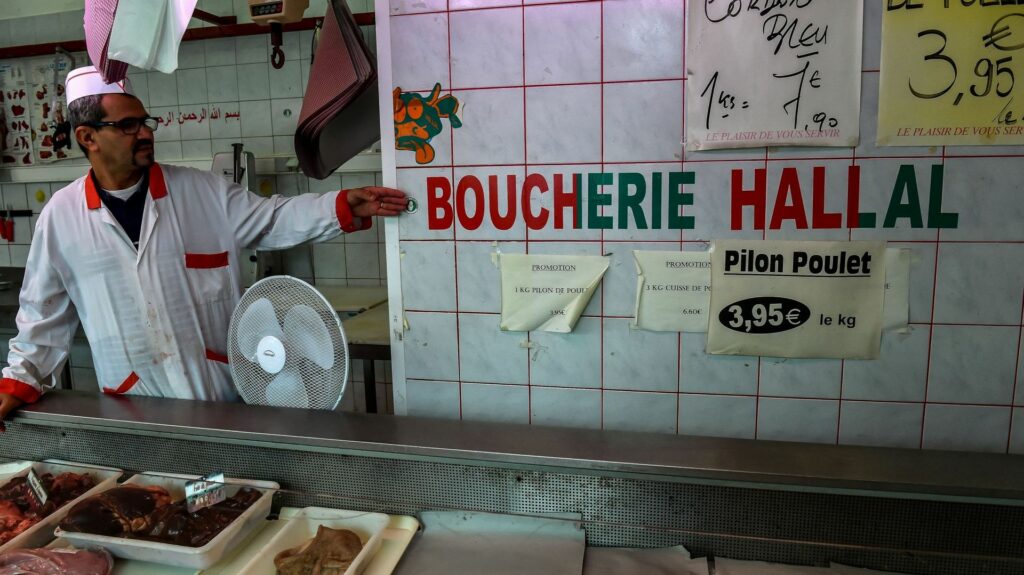GAIA, Belgium’s most influential animal welfare and rights organisation, has been campaigning against ritual slaughter without stunning for years. In October, it carried out a protest action in Brussels, where the slaughter still is allowed, to demand an end to it.
As previously reported, GAIA (=Global Action in the Interest of Animals) set up what it called “crime scenes” at different locations in the Belgian capital and claimed that animals slaughtered without stunning can be suffering for up to 12 minutes.
The Brussels Times met Michel Vandenbosch, founder and president of GAIA, to interview him about slaughter without stunning but also about other slaughter methods. He is a well-known animal welfare advocate and funding board member of the World Federation for Animals.
“The protest action in Brussels took place on one single day outside ‘strategic locations’, including the Brussels Parliament, to reach as many people as possible,” he told The Brussels Times. “We called the action sites ‘crime scenes’ to make a point to the regional government in Brussels where the issue still is undecided.
Slaughter at home was one of the first animal welfare issues which GAIA raised already in 1995. In 2006, it started campaigning against slaughter without stunning. In a demonstration in 2014 organized by GAIA, 10,000 people marched through Brussels against ritual slaughter. The campaign has largely been supported by public opinion and has so far been successful in Wallonia and Flanders.
“The only reason we campaigned for a ban is that scientific experts are clear about that there is no justification for slaughter without stunning,” he says, referring to the opinion of the European Federation of Veterinaries and the French Institute National de Recherche Scientifique. “The Belgian Constitutional Court has accepted this, following the ruling of the European Court of Justice in December 2020.
In his view, the ban against slaughter without pre-stunning is legitimate, proportional and mandatory to achieve the overall objective to prevent animal suffering.

GAIA action in Brussels, credit: GAIA
The Muslim and Jewish communities lost their appeal against the ban in the European Court of Human Rights. How did the Jewish and Muslim communities react to your campaign?
“I have told them that it’s in their own interest to respect the ban, if you believe that animals are important and sentient beings,” he replied. “It would reduce any prejudices against ritual slaughter and has nothing to do with racism because it targets all slaughter without stunning irrespective of religion.”
In practice, only Jews and Muslims are affected by the ban. Michel Vandenbosch admits that some movements of Muslims and ultraorthodox Jews refuse any change whatsoever. The time it takes for an animal to lose consciousness without stunning varies by species - for sheep it can take 2 – 3 minutes, for bovines up to 12 minutes, according to his sources.
Whatever the exact time, he says that even one second is too much. The Jewish kosher slaughter, which is performed by trained slaughterers with sharp knives, is not acceptable to him. “Whatever the sharpness of the knife, as soon as the blade starts cutting the throat, the animal is in pain and will suffocate from the blood in its lungs.”
Currently, EU legislation on slaughter, which generally requires pre-stunning, leaves it to the Member States to decide on a derogation for ritual slaughter provided that it is carried out in slaughterhouses. Several Member States do allow it and strike a balance with freedom of religion. Recently Finland, a country with 2,000 Jews and 120,000 Muslims, allowed slaughter of poultry without stunning.
For Michel Vandenbosch, it is a matter of basic ethical principles. “If you don’t apply them, it proves that you don’t take animal welfare seriously.” He says that it’s up to the Member States to decide because they have the discretion to allow religious slaughter without stunning or not. There are even Muslim countries that allow import of Halal meat of sheep that have been slaughtered with pre-stunning.
He adds that it would have been better if all Member States banned slaughter without stunning. “If you take animal welfare seriously, you should ban slaughter without stunning everywhere, given the intensity of the suffering it causes. All animal suffering at slaughter which can be technically prevented, should be banned.”
There are animal welfare advocates who think that the stunning methods that currently are used are painful and ineffective. Does GAIA also conduct campaigns against these stunning methods?
“The world would be undoubtedly a better place if animals would no longer be killed for meat,” he replied. “But at least no slaughter method should make animals suffering. We should apply the best methods that are available today and reduce the suffering to a minimum while searching for technically always better performing methods.”
He added that when stunning is properly applied, making use of the appropriate method and device, the animal will immediately lose consciousness and feel no pain. In reality that is hardly the case. Stunning methods that are not perfect are not replaced by better alternatives for economic reasons.

Michel Vandenbosch, president of animal welfare organisation GAIA, credit: The Brussels Times
In any case, animal welfare legislation in a rule of law country like Belgium must be applied, he says. “Religious reasons cannot trump animal welfare. That is what the highest courts and tens of the most respected judges have decided when it comes to the slaughter of animals. They ruled in favor of the bans on slaughter without stunning in Flanders and Wallonia.”
There is a legal obligation that inspectors or veterinaries must be ready to intervene when something goes wrong with the equipment in slaughterhouses or animals are being cruelly treated and abused. He admits that cruel treatment of animals and abuse does occur in abattoirs and more often than people believe.
If there are problems with the stunning methods, the EU and its expert agency EFSA should develop better methods. In the meantime, painful methods are allowed. A veterinary disclosed in The Brussels Times what happens in the inside of a big pig slaughterhouse in Sweden. Realizing that she could not prevent the suffering of the pigs, she left her job and now works at an animal hospital.
The existing EU slaughter regulation must be enforced but waiting for the perfect stunning method could mean waiting for ever. Why does GAIA not campaign against the cruel stunning methods for pigs and poultry in Belgian slaughterhouses?
“First, we campaign against slaughter without stunning because it’s one of the worst forms of mistreating an animal,” Vandenbosch says. “The consensus opinion among scientists is that it causes intense pain. We have also raised the issue of gas stunning of pigs but cannot raise each and every problem or protest against any form of suffering at the same time.”
“We have protested against cruelty during animal transports over long distances and campaigned against the use of cages for farmed animals (in line with the European Citizens' Initiative (ECI) ‘End the Cage Age’). As member of and together with Eurogroup for Animals we tackle these issues also at the EU-level.”
“But you have to choose your battles and decide at what level they can be most efficiently dealt with. Otherwise, you’ll risk to achieve no significant progress at all,” he explained. “I’m a reformer, not a radical. You have to know what is possible to change. I’m going so far as I can to change matters for the better.” He stressed that traditions can never justify human and animal suffering.
“You have to accept for the time being what you can achieve. It’s not an ideal situation but the best you can get - ‘the best is the enemy of the good’. At the same time, we must always continue to strive for better without forgetting what is best. If you want nothing less than everything you could end with nothing at all, in other words with empty hands.”
The special situation in Brussels
A few years ago, Brussels banned the slaughter of sheep at home which was a major hygienic, sanitary and animal welfare problem, he says. It’s still a problem because the law is not always respected nor properly enforced, especially during Eid al-Adha (Feast of Sacrifice), a Muslim holiday which is celebrated during three days each year.
The ban on home slaughter without stunning during Eid al-Adha is also a major problem in Wallonia and it should be banned everywhere in Belgium, he added. Slaughter with stunning cannot be applied at home because ordinary citizens do not possess the necessary skills or knowledge how to operate stunning devices requested by law.
“In Brussels, there is only one slaughterhouse where up to 30,000 animals are slaughtered without stunning each year. This place is going to be shut down in 2027 which would end the slaughter without stunning in the region. To replace it by another slaughterhouse for political reasons somewhere else in Brussels would be totally unacceptable. The pragmatic solution is to have a ban in place by 2027.”

“These highly social and intelligent beings spend most of their lives in this condition, as if they were already sausages.” (Yuval Harari)
While Michel Vandenbosch has been successful in preventing the suffering at slaughter of some animals, the overwhelming majority of farmed animals continue to suffer. In its report ‘The grim reality of industrial animal farming’ (2023), the animal welfare NGO Eurogroup for Animals, summarizes the situation as follows:
Farmed animals are being bred to endure lives full of pain, from being kept in cages to being pushed beyond their physical limits, after which they are slaughtered in ways that cause even more suffering. Most of the pigs across the EU are stunned and killed using carbon dioxide, which causes extensive suffering to them.
Most broilers in the EU are stunned for slaughter using electrical water baths before having their throats cut. The stunning process, which is meant to improve their welfare during slaughter, is often ineffective and causes considerable suffering, according to scientific reports quoted by the NGO.
Michel himself doesn’t eat any meat all. “We are living in a non-perfect world where progress is made step by step,” he concluded. He is engaged in several animal welfare issues. Last February, he co-authored a book on cultivated meat together with Philip Lymbery, Global Chief Executive of Compassion in World Farming International.
Cultivated meat has the potential of becoming a game changer in providing meat to the growing global population without exceeding planetary boundaries, according to the book. It’s non-slaughtered meat and could therefore also become an acceptable alternative for Jews and Muslims. If harm reduction is the guide, cultivated meat might even become an alternative for Hindus. But we aren’t there yet.
M. Apelblat
The Brussels Times

